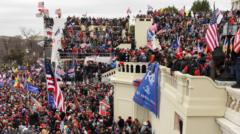As the 2024 election approaches, defendants of the January 6 Capitol riot anticipate pardons from Donald Trump, who has pledged clemency for "innocent" participants while investigations continue into the events of that day.
Rioters Hold Out Hope for Trump Pardons in Wake of January 6 Events

Rioters Hold Out Hope for Trump Pardons in Wake of January 6 Events
Supporters of Donald Trump, including many convicted for their roles in the Capitol riot, express optimism about possible pardons as the former president prepares for a potential return to office.
Following the historic January 6 assault on the U.S. Capitol, some participants continue to cling to hope of pardons from former President Donald Trump, who has previously referred to them as “patriots.” Derrick Evans, a former West Virginia legislator and one of the rioters, stated that receiving a pardon would be “life-changing” for him and others still facing legal repercussions. After pleading guilty to civil disorder and serving three months in federal prison, Evans is among many who believe Trump will honor his promise to issue pardons for those involved in the Capitol riot.
Throughout his campaign and beyond, Trump has asserted his intentions to pardon the rioters, whom he refers to as political prisoners. In a post on Truth Social, he mentioned that one of his first actions as president would be to “Free the January 6 Hostages being wrongfully imprisoned!” His statements have sparked discussions on whether he might pursue blanket pardons or make decisions based on individual cases. As investigations into January 6 remain ongoing, with nearly 600 individuals charged, the scene grows increasingly complex.
Recent weeks have seen requests for sentencing hearings delayed by impeached defendants who await potential clemency, an anticipation that is also fueling a sense of excitement among rioters and their supporters. With the upcoming election cycle and Trump's potential return to office—to be inaugurated on January 20, 2025—conversations around pardons have intensified.
Organizations monitoring these developments express concern about the implications of potential pardons. Wendy Via, co-founder of the Global Project Against Hate and Extremism, noted an alarming trend of supporters referring to the rioters as prisoners of war. Many involved in these groups plan to remain low-profile until an expected influx of pardons.
While it remains uncertain how many, if any, will be pardoned, the surge of optimism among rioters like Evans highlights just how much political fortunes and interpretations of justice can change in the hallowed halls of American democracy.




















